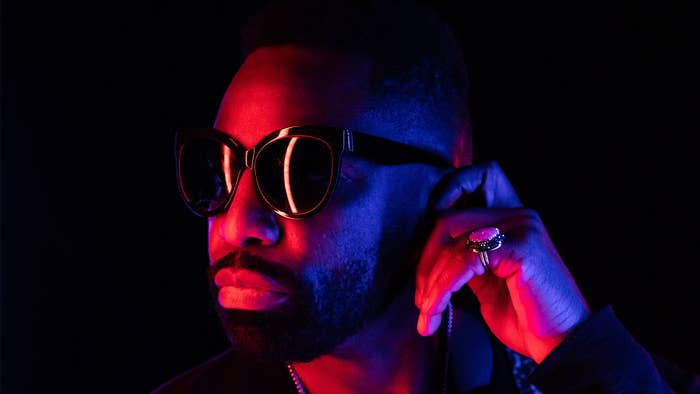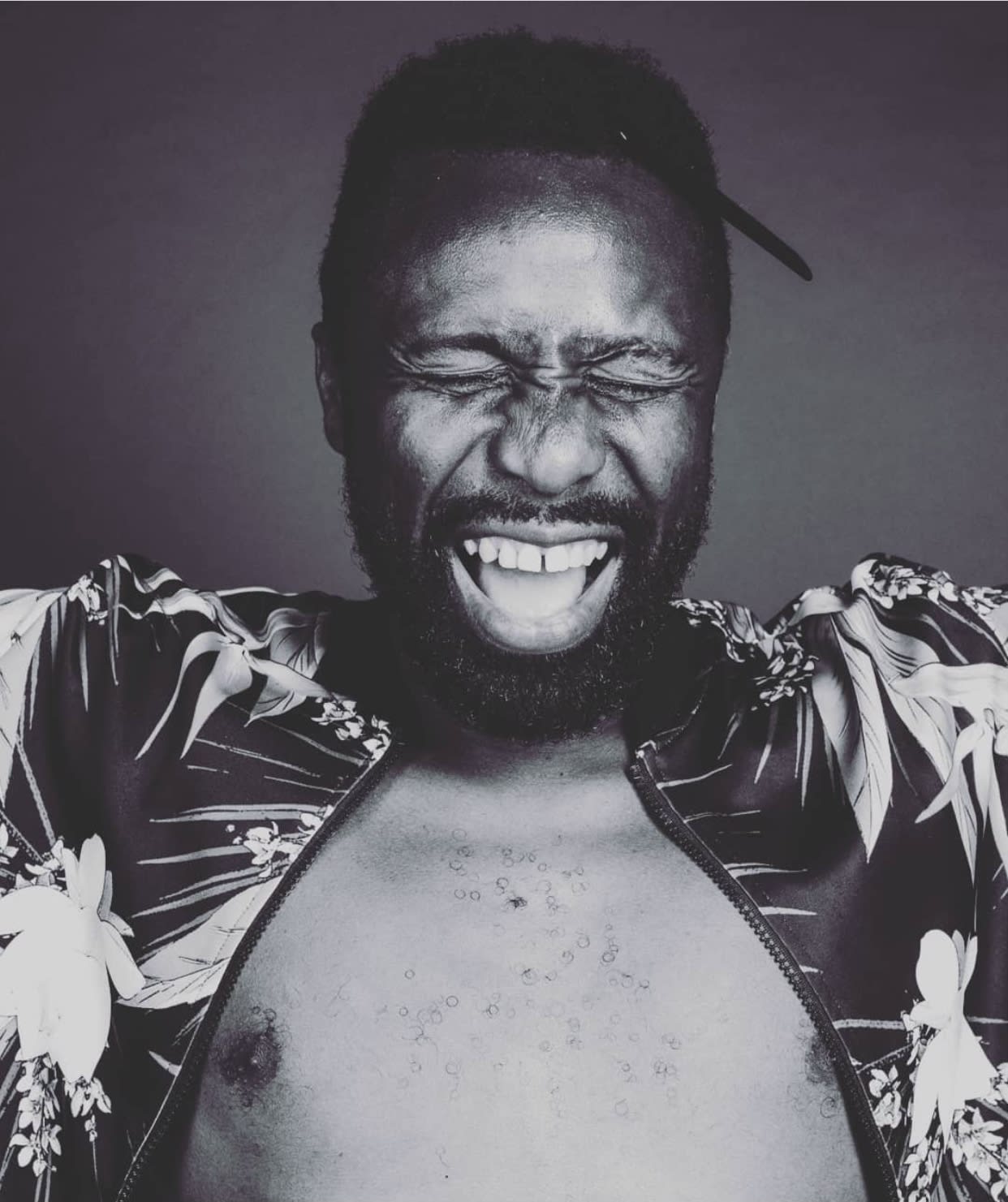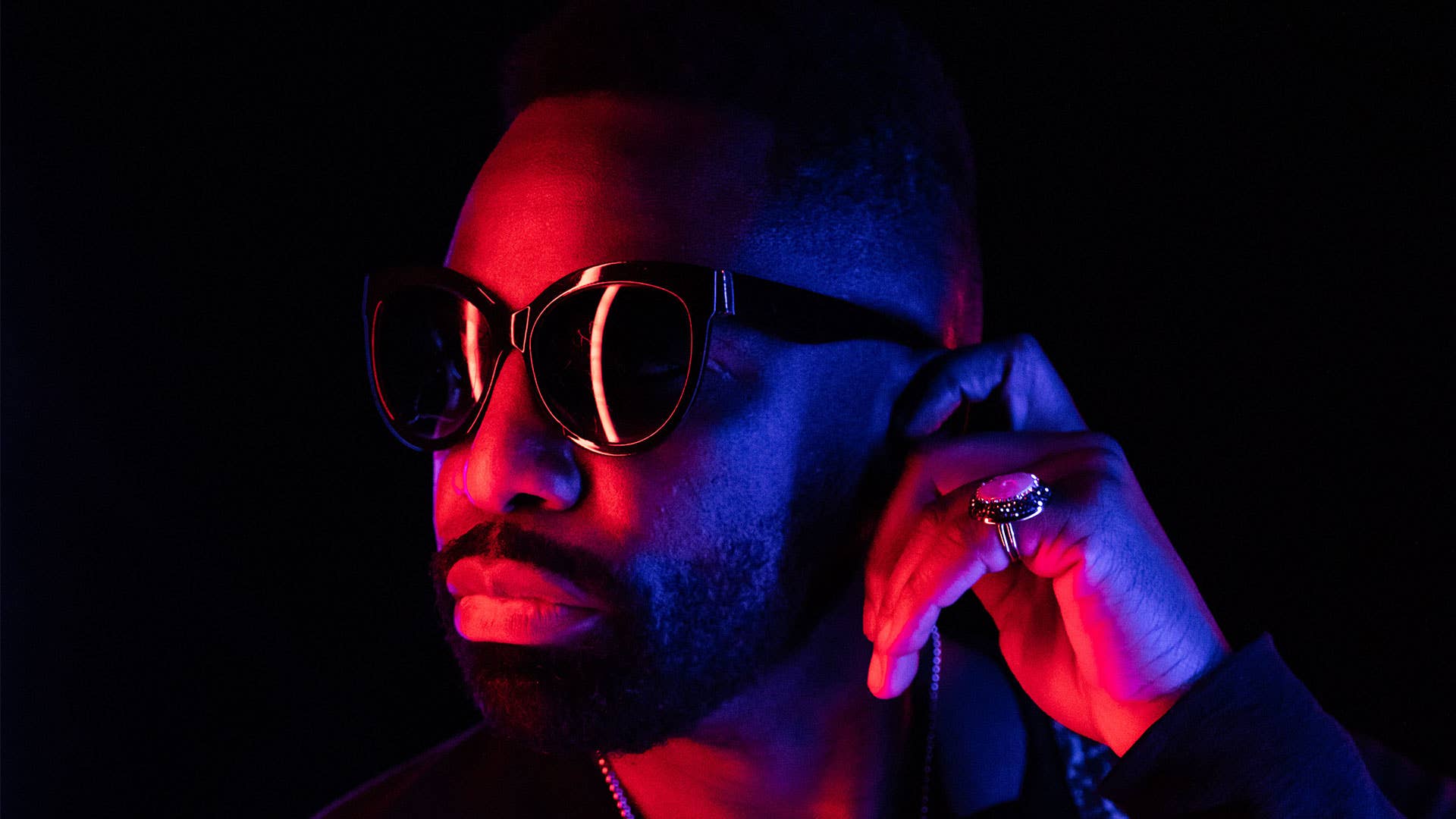
Before he became an author for one of the world’s best publishers, before he became an eclectic performer that captivated crowds across Canada, before he could quote swaths of literary passages off the cuff during interviews, Antonio Michael Downing was an overwhelmed Trinidadian boy gazing at a Canadian icicle for the first time, baffled by how it wouldn’t melt.
“Back in Trinidad, I’d never seen ice outside a freezer, and it was like a miracle to me,” Downing says of an emblematic moment in his immigrant journey, which he chronicles in his new memoir Saga Boy (published by Penguin Random House Canada). Eventually he not only found his footing in Northern Ontario, but went on to become a hotly hyped R&B and hip-hop artist under the alias John Orpheus. But the wintery imagery of that icicle anecdote remains apt, because he describes his default writing mode as an “avalanche of language” that engulfs the listener in abstract imagery. It’s also a genre force majeure, pushing him to release a trio of mixtapes in 2018 spanning hip-hop, West African, and jump-up drum music. Today he releases “Fela Awoke (I Will Miss You),” a new single and video from his forthcoming album, also titled Saga Boy, dropping May 21. The song finds Downing thriving outside his comfort zone, his lyrics more concise and plot-driven than his typical avalanche abstract style, though the album is also rife with the latter.
Below, Downing tells us more about the duality of his colonial education and African roots, his love of artists as seemingly disparate as Biggie Smalls and Hank Williams (who Downing swears would be friends), and how working on Saga Boy the book and the album fulfilled him in different ways.
In Saga Boy the book, you credit your voice to your grandma, who back in Trinidad had a “hypnotic effect on everyone who stopped to listen.” When did you begin attributing your talent to her?
Wow, jumping into the deep stuff straight away!
We could start with a simpler question and circle back, if you like.
No, it’s OK. I don’t like talking small. Her wisdom, and way of moving through the world, is her legacy to me. In the same way that she read the Psalms of David in the Bible, music was another way for her to pray.
Working on the book, I also realized singing was her way to cope. You can see, behind me, my new Union Jack paintings [gestures at canvases coated in colorful, modern-art renditions of England’s flag by artist Barry Lorne]. I hung them to celebrate my connection to colonialism. My grandmother was a Black woman born in Trinidad in 1904, and had no agency. Right up to when I was born, my people were in the backwoods of the Empire. You had to make do with the legacy of slavery. Think about it: the Trinidadian men were running wild, drinking and gambling and knife fighting. They were all feeling the weight of their Black skin. Songs were her way of lightening that burden.
People would often drop what they were doing whenever they were in earshot, and take in the song she was sending out. In that way she was lightening the burden of others.
That’s why I sing both about her and Fela Kuti on my new single. There’s a story about him at an African shrine, thanking those gathered for traveling far so they could fill their cups with music and survive another week. Renewing the sprit is a powerful thing. That’s what I realized was my grandma’s gift to me.
"My new book is about a Black kid, an immigrant. But truthfully, it’s just about a person trying to find their place in the world."
When did you realize that?
It’s strange: in my teens I would usually not think of, or remember her songs. But the moment I felt sad or cornered, her singing would come back to me. I’d be singing those songs to myself without knowing they were hers. Then, I’d forget them again. They’d come back to me like visitations from ghosts. Like how Homer or Virgil talked about ancient poets and their muses, and the singer being a conduit. The epic poems were meant to be sung, after all. With the The Odyssey, performers would pull out harps and recite history. Same with the bards in England. And African performers would use drums to carry the structure of their performances, but they also had that oral storytelling tradition.
Are hip-hop MCs the modern equivalent of that?
Well, in Africa poetry was a recitation. It absolutely makes sense to me that hip-hop came from that. And hip-hop also came from Gil Scott-Heron, from Muhammad Ali’s slick talk, and Jamaican toasters, because pioneers like Afrika Bambaataa were of Caribbean descent.
It’s not just words on a page. You don’t just read[takes on a faux monotone and pretends to look at a book]“The revolution will not be televised.” No, you proclaim it: “The revolution will not be televised!” Hip-hop came out of that. It’s about the words and drums and rhythm being one thing. My grandmother with her songs, Ali with his slick talk, it’s the same damn thing.
What do you mean by that?
Here’s an example: I used to play banjo with Danny Michel, who I think is a Canadian folk legend. We were friends mostly because we liked to drink rum and talk about Bowie. One day I hit him up while travelling in New Orleans, because I saw a six-string banjo in a shop, and he asked me to either buy it for him or keep it and join his band. It was a great band too. The drummer once played with Xavier Rudd and opened for Paul Simon in Central Park. We called the bassist The Colonel because he looked like the KFC logo, and he was so old he opened for Hendrix. Then there’s me on banjo, and I’d get teased: “Yo, why is the Black guy playing the whitest instrument ever!” And I came to find out the banjo arrived in America through African slaves. Every culture has that— harmony and rhythm and words, and the power of words.
So when I think about hip-hop, I think about Chuck D calling it the Black CNN, the way we record the news. There’s a beauty to that. But I’m more of an abstract artist. Not usually topical. My new song, “Fela Awoke,” is a topical song, though. I structured it in a way that you can clearly follow along. But sometimes my lyrics will be absurdist, like an avalanche of language, so that you can feel the humanity raging inside me.
So if you want to write a more topical, direct song it takes more effort and editing?
I think so. I don’t prefer one mode over the other. Hank Williams was the best because, in four lines, he could finish an entire drama about two young characters and their broken hearts. Biggie was like that too: “Arizona Ron/From Tuscon, push the black Yukon.../Stupid as a youngin, chose not to move wisely/Ron vanished, came back, speaking Spanish/Lavish habits, two rings, 20 carats/He's a criminal, nigga made America's Most…”
You hear that and think: “Holy fuck, why did he vanish? And how come he came back with those expensive rings?” That’s the beauty of it. And if you ask me one question, I’ll clearly tell you four stories! [Laughs.] So when I hear Biggie, I want to master that conciseness. Both he and Hank had a gift like Miles Davis, who said “It’s not about the notes you pay, but where you put the spaces.” It’s not always what they tell you, but also what they don’t tell you.
“IG,” another song on my new album has my favorite hook: "I got my boxed lunch/ I got my doggie bag/I got my hard hat baby and I'm puttin’ in work!" It’s about me feeling like a kid going to school, me connecting to my inner child. I could come right out and say that, but it’s way more fun to give that vibe to you.
Is that sentiment true for not only John Orpheus the musician, but also Antonio the author?
In the book, I don’t tell you I went to dancehall parties as a teenager. I describe how we went to someone’s house, people were making out outside, something was throbbing and pulsing and I didn’t know what it was. Suddenly, I’m in the basement and people are dancing and banging on the furnace. And the DJ is yelling, “Wheeeeeeel selector!” I want you to feel it. Taste it. Get it on your skin and in your nostrils, so you know what I’m going through.
Yes, I wondered how you could describe those details so vividly in the book. Though, based on your ability to recite everything from The Odyssey to Biggie off the cuff, it’s obvious you have a good memory.
It’s funny though: most of us think of memory as a record. But I’m sure you know the famous scenario about 10 witnesses of a car accident with 10 different stories. Truth is elusive.
So I did 250 hours of interviews with people who knew me from when I was a baby bump, right up to when I was writing this book. And what I learned was memory is just this thing to protect our egos. We tell ourselves a story—maybe my ex and I are each telling different stories to make ourselves look good. We believe what we want to believe, and remember things that serve our emotional intent.
And how have you selectively remembered to serve your emotions?
When I became an immigrant as a child, everything I knew was gone. I went to sleep in the jungle, and woke up in a blizzard. I remember staring at icicles and not understanding how they didn’t melt. Back in Trinidad, I’d never seen ice outside a freezer, and it was like a miracle to me. Compound that with 10 thousand other things. I was a confused boy, no tools to find my bearings. I held onto the memories of everything that happened before that, because they were the only thing that anchored me. That’s why the first part of my memoir, back in Trinidad, is so different from the rest.
One of the most famous memoirs of all time is Angela’s Ashes. The author, Frank McCourt, writes about growing up in Cork when all these kids were dying, but they’re Irish Catholic so they just keep having more. [Laughs.] I’ve always loved memoirs, but I read 30 more before writing my own, to make sure I’d studied up. And Angela’s Ashes is one of the best. I love how he came to New York, and could only get a job in Brooklyn teaching all Black kids. And all the kids knew that if they wanted to distract him and not have to do any work that day, they’d just ask him to tell stories about Ireland. By the time he retired and began writing Angela’s Ashes, those stories were so well rehearsed that they flowed right out of him.
For my memoir, the first 100 pages is where people fall in love with the book, because it’s like an immersive dream. And that’s because part of me never left Trinidad. For everything after that, the opposite is true. I’d deleted many of those memories, and going back into them was a shock. For the first third of my book, I only spent 10 percent of the time and effort. I spent the other 90 percent on everything that happened after I was 11, because it was so painful.
Tell us more about deleting those later memories.
We’ll delete memories we don’t want to believe. Or we’ll enlarge a memory that makes us feel good, and diminish any that make us feel bad. One of my favorites, though, is what I call putting Vaseline on the mirror. That’s when you can’t delete a memory, but don’t want to see it clearly.

What are some examples of these, for you?
I had an incident on a school bus, where I was coming back from playing a basketball game and had a tantrum. I knew something happened on a bus, but it was foggy for me.
I knew I had to talk to my best friend from high school, because he was probably sitting next to me on the bus. And he told me how the coach’s favorite kids would bully everyone else, and when they started with me, I blew up and threatened them for 20 minutes until we got to the school. When the coaches found out, they called the police on me, as the good citizens they were.
So sorry you went through that.
These coaches’ job was to take care of us, and they enabled these guys to bully me, and never asked why I was pissed off. My friend and the other kids were happy I stood up to them. But I carried all this shame, so I put Vaseline on the mirror. Yet, the truth cuts through fuzzy memory tricks. Because part of you realizes how much you embellish.
A lot of me writing this book was engaging with difficult memories. I’d gone to six high schools in five years. I had five sets of guardians. I was a traumatized kid. I did a lot of interviews to not only fact check what happened, but also to talk through those memories and see what came through as the truth, and what didn’t hold up. Because most of us keep it moving, onto the next thing. It was like I kept trying coats that wouldn’t fit, because I hadn’t made peace with my past. That’s where this book started up. It was like an excavation. I was pulling memories up like ships off Lake Erie, reliving them and finding out about myself. A lot of it was super fucking hard. But ultimately super redeeming and fulfilling.
"I recognize the legacy of both the skin I’m in and my mind’s design, not by me but by the Queen and King James. And I take hold of both."
You mentioned being traumatized as a kid. Did music lift those burdens, like how you described your grandma doing?
Yes, it made me feel better to sing. If people were watching me on stage, I must belong and be important. Right? It was a way to bolster my self-esteem. But not a very good one, because it falls apart. It became a place to process hurt. But also, I could sing for other people, and that was a miracle.
My old band, Jen Militia, and I would hang out and I would try to turn how we were feeling into songs. I’d sing about the gin and 7 Up we were drinking, but it was really about how we were a crew and a family. When audiences would sing along, I’d think: “My God, you can write something in your bedroom and human beings will take ownership of it?” That’s the great alchemy of being an artist. That’s me taking what’s personal, and making it universal.
So, my new book is about a Black kid, an immigrant. But truthfully, it’s just about a person trying to find their place in the world. And it’s about family—my brothers and father and grandma—making the most of the hand they’re dealt. I latch onto the most human details of the story, not the most Trinidadian, the most immigrant or the most Antonio Downing. So far, the book has only been available for about a week, and people are already messaging me to say it reminds them of their own families. Hopefully that’s the book’s legacy. I hope my music does that too.
If your hopes for the book and music are similar, how does each medium differ for you?
One of my favorite lines in Shakespeare is in Henry V. There’s a new adaptation on Netflix called The King— I don’t know if you like historical dramas, but I love that shit. Anyway, Henry is a wayward kid, the saga boy, here there and everywhere. Then his dad dies, and he becomes king. Now he has to be responsible. And Henry has this great line, that basically means: “They judge me by my younger days, but not what use I’ve made of them.” Saga Boy the book is about my younger days. The album is about the use I’ve made of them, the man I’ve become because of that journey, my healing and my celebration of that.
That’s a long way to quote Shakespeare, I know. But I have to rep the Bard— I’m in front of the Union Jack, after all [laughs and gestures again at the flag paintings behind him].
Speaking of the monarchy—I was surprised by your nuanced take on colonialism in the book, and in this interview. I expected it to be more straightforwardly painful.
The temptation is to go back before your trauma. But you can’t. I can’t undo the fact that I learned to read the King James Bible when I was three. By the time I’m 6—the age when most experts say your whole psychological dynamic is set—I could tell you Hamlet’s dad was a ghost, thanks to my colonial schooling. That’s why the first and last lines in the book are, “The Queen designed my brain.” How do you undesign your brain? Well, at least you can hijack the programing for your own purposes. If I hadn’t learned all that from the Queen’s English, I wouldn’t have been able to write this book. I was spoon fed the Bible, along with milk and rogan lamb. The Union Jack is in the infrastructure of my mind.
When I was a teenager, I had a dream that my grandmother was in a white toga. She was walking out of a cemetery, and people were rushing out ahead of her. A woman with three kids in her arms yelled at me: “She left you everything!” And I knew she meant grandma left me wisdom. Then: here comes grandma, like Julius Caesar, with a toga and a crown, because Rome is of course the history of Europe, and all of the colonizers since have tried to be equally imperial. She hugs me, crying, saying, “I’m always with you, even when you can’t see me.” I woke up, 17 years old, crying. I’d been to six high schools in five years. And I realized she is where I belong. Not a place. The feeling of home was the feeling of my grandma.
The colonizer and colonized were wrapped into one thing. That’s who I am. The Queen is in my brain. But that’s why I throw a Biggie reference with Homer. A Shakespeare reference with Hank Williams. I recognize the legacy of both the skin I’m in and my mind’s design, not by me but by the Queen and King James. And I take hold of both.
Tell us more about taking hold of both.
It’s why I was rapping in a punk band as a kid, or aping Gil Scott-Heron in a Britpop band. It’s why I can write a Bob Dylan style topical song like “Fela Awoke” but sing it in a Trini accent. I can strap on a guitar, but still make rapper hand gestures and be Black as fuck. Because I’m both. Or neither. Take your pick.
I have a song on the new album, “Ọlọrun,” about the West African ruler of the sky gods. It’s the most unique song I’ve made. It’s all drums and women responding to what I’m singing, like a Greek chorus. Except it’s more like they’re shrieking an answer back at me. But that’s what’s up. I’m pulling from all these different legacies that are mine and not mine. I think about colonialism, and I focus on the human aspects. I focus on how to use my grandmother’s wisdom and resilience to temper the colonizer energy I was surrounded by as a boy.
Do you think she’d be proud of how you’re trying to reconcile that, and becoming a published author and celebrated musician in the process?
I don’t know. But I feel what I’ve become, she had a say in. It’s like she made my art with me. I’ll try to live the life my ancestors couldn’t, that my grandmother couldn’t because she lived in the backwater of the empire.
Please understand: I’ll deploy every tool they used to try and “civilize” us in my own way. And hopefully there will be a Black kid connecting with my book or music, feeling empowered. I’ll take the tools my grandmother and the Queen taught me. And now my grandmother will be the Queen—I’ll take the crown and put it on her head.



